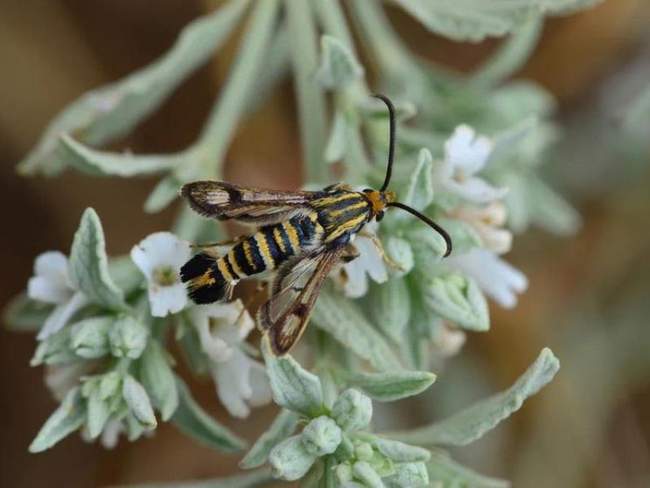Меню
Соціальні мережі
Розділи
Sept. 2, 2024, 9:56 a.m.
Insect discovered in Crimea is found in Turkey
This article also available in English343

Photo: t.me/VentdeCrimee
A unique insect discovered in Crimea 5 years ago has now been found in Turkey
This was reported by the Crimean Wind Reserve Telegram channel.
The post refers to the Efetov's glass beetle (Chamaesphecia efetovi), which belongs to the class of insects, the order of Lepidoptera and is named after the head of the department of the Crimean Vernadsky University, Professor Konstantin Efetov.
"In the course of evolution, over millions of years, glasshoppers have learned to imitate almost perfectly the miserable hymenoptera - wasps (including hornets) and bees. In this case, the glasshoppers are completely innocent. But it is precisely because of this resemblance that they are protected from birds and other insectivores who are afraid to deal with a wasp or bee because it can sting. Glasshoppers are a classic example of mimicry, when an unprotected species began to resemble, for example, a wasp in appearance and even in the sounds it makes during flight. In this way, they learned to save themselves from enemies," says Efetov.
The glass bat has already been found in the Lower Volga region, the North Caucasus, Romania, Bulgaria, and Serbia. Its habitat covers the Black Sea like a horseshoe.
Kostiantyn Efetov is a biologist and biochemist. After Russia's occupation of Crimea, he remained on the peninsula as a head of the department and actively cooperates with the occupation authorities. He remained to work at the university according to Russian standards.
Earlier, it was reported that there was information about an atypical catch of dark (Korean) perch in the Black Sea. The dark perch (sebastichthys schegelli, Hilgendorf, 1880) is a large predatory fish species that feeds mainly on small fish and crustaceans, reaching a body weight of 4 kg and a length of more than 60 cm. This fish species is native to the Far Eastern seas. This invasive species was first recorded in the Black Sea off the coast of Crimea in 2013.
Also, scientists from the Russian Institute of Biology of the Southern Seas discovered a new species of bivalve mollusc in the outlet channel of Kamysh-Burun Bay. Experts believe that the mollusk of the mithylid family Arcatula migrated here from Romania. Scientists call it an invader and say that it is a threat to native species of marine ecosystems.









